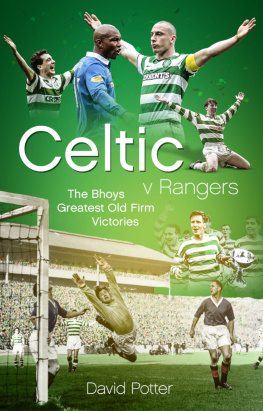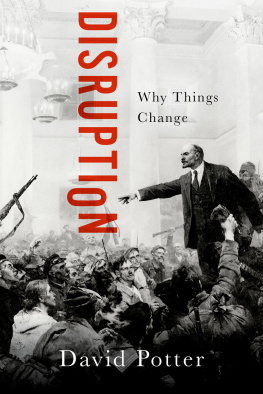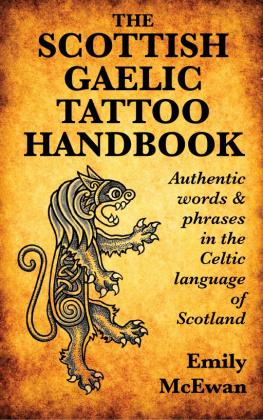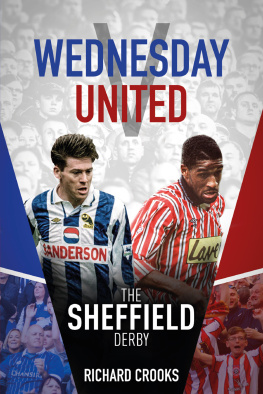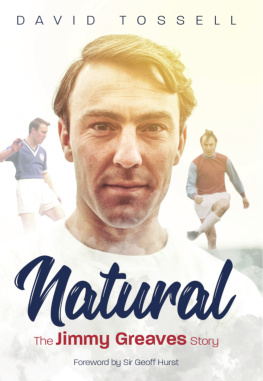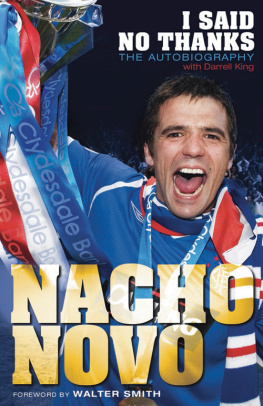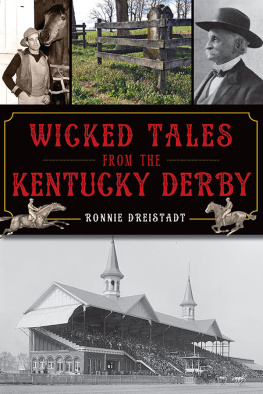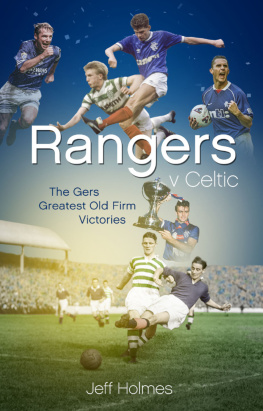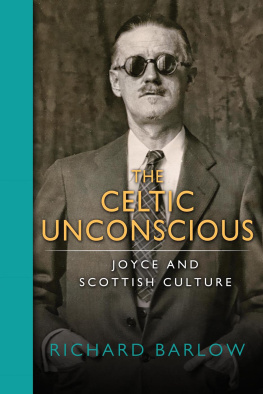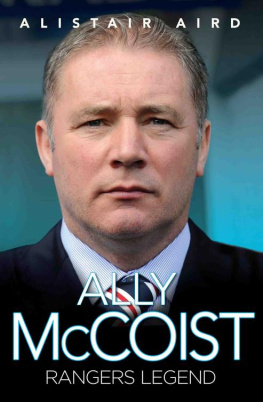First published by Pitch Publishing, 2019
Pitch Publishing
A2 Yeoman Gate
Yeoman Way
Durrington
BN13 3QZ
www.pitchpublishing.co.uk
David Potter, 2019
All rights reserved under International and Pan-American Copyright Conventions. By payment of the required fees, you have been granted the non-exclusive, non-transferable right to access and read the text of this e-book on-screen. No part of this text may be reproduced, transmitted, downloaded, decompiled, reverse-engineered, or stored in or introduced into any information storage and retrieval system, in any form or by any means, whether electronic or mechanical, now known or hereinafter invented, without the express written permission of the Publisher.
A CIP catalogue record is available for this book from the British Library
Print ISBN 978-1-78531-567-1
eBook ISBN 978-1-78531-569-5
--
Ebook Conversion by www.eBookPartnership.com
Contents
INTRODUCTION
RANGERS! The very name conjures up all sorts of emotions shivers down the spine, a cold sweat, a sudden and compulsive desire to shout and swear, and certainly a willingness to see them beaten, humiliated, degraded, hammered all these things!
And of course we all got our desires in 2012 when they went bust. It came as a shock to me the first time I heard the song about us having a party when Rangers die, for I did not think that it was possible for anyone to believe that Rangers could actually die. Yet Third Lanark died. So did Leith Athletic, Airdrieonians, Clydebank and a few more. But Rangers? Could it happen?
It certainly did. What about the team that now play in blue at Ibrox. Are they Rangers? Technically, I suppose not, but they look awfully like the old Rangers to me with their colours, their supporters, and their offensive songs, so call them Sevco, Newco if you want, but it sounds so much better if we can say that we beat Rangers or even the Rangers!
The desire to beat Rangers is visceral, and this has been the case since the early days, although it is probably true to say that in the 1890s the real Glasgow rivals were Queens Park. But Queens Park refused to enter the Scottish League at the start, and Rangers became the main target, especially when they showed that they too could amass a big support and win things. By the 1920s, a new dynamic had entered the equation in the shape of sectarianism when Rangers (incredibly to modern eyes) refused to employ Roman Catholics.
The passion of these games is all-encompassing. I recall back in the late 1950s and early 1960s, when I was as yet too young to go to such games, the sheer gut-rending tension of the occasion, and the sheer fear to put on the radio to listen to a commentary of the games. I recall the New Years Day game in 1962 being postponed. What a relief! I could enjoy New Year without the gnawing away at my vitals of the thought that, sooner or later, I would have to face listening to the score! Older people said, You take that football far too seriously but so did they! Indeed the passion was, and remains, shared by millions throughout the world.
Several years ago I heard the story of one of Celtics greatest-ever players who, after he retired, could not bring himself to watch or listen to an Old Firm game. and his trick, on New Years Day, for example, when the second half was broadcast on the radio, was to take the dog for a long walk and then to watch for returning supporters buses to judge by the demeanour of the passengers how the game had gone. Sadly, we are talking here about the awful days of the early 1960s, and so often it was the Rangers buses who were singing and flag-waving, while the Celtic buses were enveloped in gloomy, morbid, brooding, introspective silence!
And yet, we sometimes do everyone a disservice when we concentrate to an excessive extent on Rangers. They are, after all, just one club, and Jock Stein was always at pains to indicate that the points that Celtic got for beating St Johnstone, Partick Thistle and Falkirk were just as valuable as those for beating Rangers. One recalls, for example, the 1969 season when Rangers beat Celtic twice (they only played each other twice in the league in those days), yet Celtic won the league!
There is, of course, one major flaw in that argument, and it is that the other teams in the Scottish League, although quite capable of having their moments of glory, nevertheless seldom make an impact on the Scottish League. 1985 was the last year that any team other than Celtic or Rangers won the Scottish League, and that statistic needs no amplification!
So, yes, beating Rangers is important, and this book is an effort to put together 50 of the best victories over Rangers. Some will be vexed that their favourite game is not there, but I have attempted to include as many from the old days as are appropriate. Why? Because I have a recurrent nightmare that the day will come when Celtic supporters dont know who Sandy McMahon or Jimmy Quinn were. They were as important in their day as James Forrest and Odsonne Edouard are today.
Speaking personally, although I attend games against Rangers, they are not my favourite games. There is just too much hatred there directed towards people who, although of a different tradition perhaps and wearing different colours, look perfectly ordinary sort of people. Bile and hatred can, on occasion, go too far but there is the amusing side to it as well when we realise that some of them actually may well live in the same street as us, or work alongside us in the factory or the office, and certainly breathe the same air as we do. One recalls the tribute paid to a grand old Celtic supporter of whom it was said that the word Celtic was written on his heart in such large letters that there was no room for hatred or rancour towards anyone else.
Some of my best friends support Rangers. This sounds like a patronising clich to show how broad-minded I am, but in fact there is little choice. There are loads of Rangers supporters around, not all of them worthy of the now offensive H word (some are however worthy of being so named, as everyone in Manchester in 2008 would have told you) and if I were to exclude from my circle of friends all those with whom I disagree, I would have no friends left!
None of this, however, should be allowed to detract from the rivalry, passion and excitement that Old Firm games engender. They should be looked forward to, and a win should be celebrated by singing and flag-waving, while a defeat should be taken with equanimity and calmness. There is a place for depression and despair for a good half hour after the final whistle. After that, the questions should be Who do we play next week? and When do we play them again?
ONE
ON THE WAY TO THE FINAL
Celtic 5 Rangers 3 | Scottish Cup Semi-Final |
Old Celtic Park | 6 February 1892 |
Celtic: Cullen, Reynolds and Doyle; Maley, Kelly and Dowds; McCallum, Cunningham, Brady, McMahon and Campbell Rangers: Haddow, Hodge and Dunbar; Marshall, McCreadie and Mitchell; Watt, Henderson, Law, McPherson and Kerr Referee: Mr G. Sneddon, Queens Park |
THERE was little doubt that the early success of the Celtic Football Club in three and a half years had been little short of phenomenal. In the calendar year of 1891, the club had won the Glasgow Cup twice (in February for the 1890/91 season and in December for the 1891/92 season) and there was a noticeable increase in attendance and certainly excitement whenever and wherever they played. Not only that, but there was ambition in the East End of Glasgow with the new stadium being built (to a large extent by volunteer labour) with the express intention of hosting Scotland v England games. It was not that there was anything all that wrong with their existing ground just that the club was growing too big for it.

